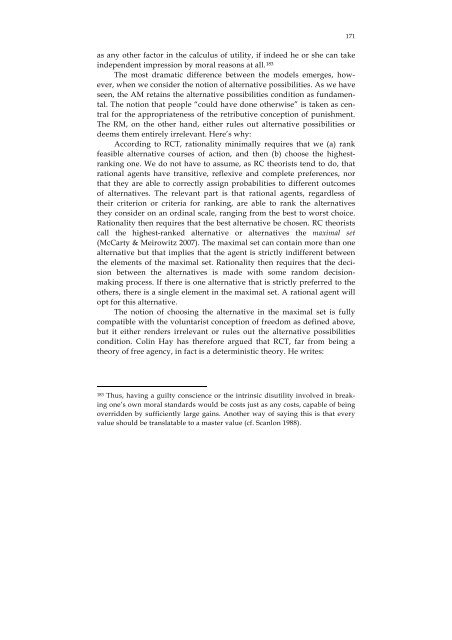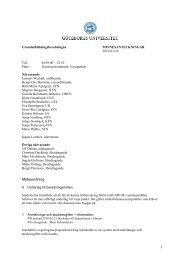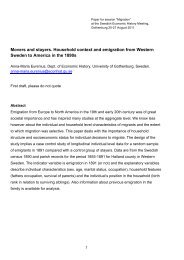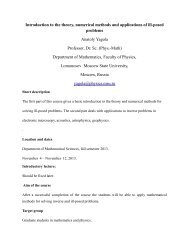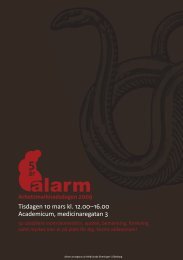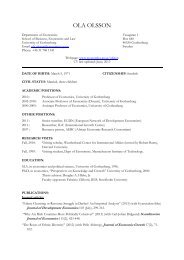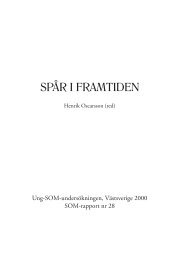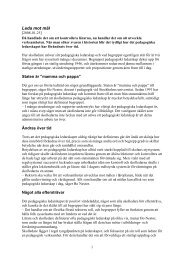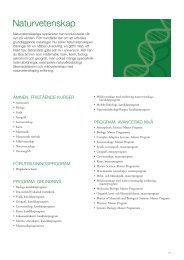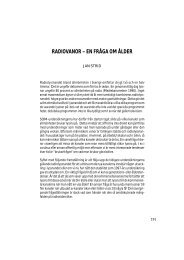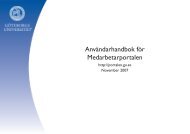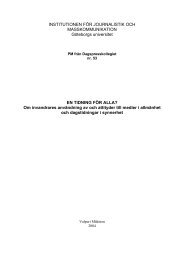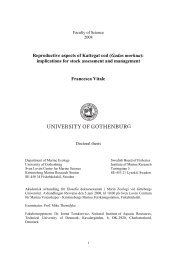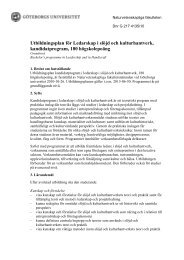- Page 1 and 2:
Punishment and Personal Responsibil
- Page 3 and 4:
ACKNOWLEDGEMENTS...................
- Page 5:
8.6 MORAL AND POLITICAL CONSEQUENCE
- Page 8 and 9:
2 tionable asymmetry, which seems t
- Page 11:
Part I. The Problem
- Page 14 and 15:
8 right to punish, from which the l
- Page 16 and 17:
10 in favour of the action or pract
- Page 18 and 19:
12 ment: where the right to punish
- Page 20 and 21:
14 A psychiatrist, Menninger espous
- Page 22 and 23:
16 question with colleagues and stu
- Page 24 and 25:
18 will endorse the form of punishm
- Page 26 and 27:
20 causally responsible for X if on
- Page 28 and 29:
22 thus a prerequisite of desert, a
- Page 30 and 31:
24 Sticking point 4. The possible c
- Page 32 and 33:
26 And further: “This is not subj
- Page 34 and 35:
28 theory I will defend in this boo
- Page 36 and 37:
30 The same tendency towards “tou
- Page 38 and 39:
32 A shrinking sphere of responsibi
- Page 40 and 41:
34 disorder than freely chosen acts
- Page 42 and 43:
36 sentment. Why should this matter
- Page 44 and 45:
38 retributivism is normatively mor
- Page 46 and 47:
40 tions as the potential truth of
- Page 48 and 49:
42 OUTLINE OF THE BOOK The rest of
- Page 50 and 51:
44 scientific explanation of crime
- Page 52 and 53:
46 render obligatory certain action
- Page 54 and 55:
48 can ideally promote compliance w
- Page 56 and 57:
50 pursued by imposing pain or depr
- Page 58 and 59:
52 be criminalized and within the s
- Page 60 and 61:
54 decriminalization. 62 No act is
- Page 62 and 63:
56 What is the relevance of example
- Page 64 and 65:
58 2.5 PENAL REGIME, WHAT? So far I
- Page 67 and 68:
61 3. Three Theories of Punishment
- Page 69 and 70:
63 offer both rational and moral ju
- Page 71 and 72:
65 ment the state may see fit. They
- Page 73 and 74:
67 since it represents a cost that
- Page 75 and 76:
69 marriage. The criminalization of
- Page 77 and 78:
71 therefore tended to argue that a
- Page 79 and 80:
73 that punishment could cease to b
- Page 81 and 82:
75 still have defended rehabilitati
- Page 83 and 84:
77 ing the desire to commit crime.
- Page 85 and 86:
79 committed crimes such as speedin
- Page 87 and 88:
81 Now, a number of things are note
- Page 89 and 90:
83 quence of a particular penal sch
- Page 91 and 92:
85 punishment, but is also a reason
- Page 93 and 94:
87 empirical question. It can safel
- Page 95 and 96:
89 or her victim(s). The slogan of
- Page 97 and 98:
91 Retributivism by proportionality
- Page 99 and 100:
93 interpretation of proportionalit
- Page 101 and 102:
why it is wrong to say that retribu
- Page 103 and 104:
97 few seem to have resorted to it.
- Page 105 and 106:
99 can be disentangled, and it is t
- Page 107 and 108:
101 punishment: that one should not
- Page 109 and 110:
103 find unacceptable. Deterrence n
- Page 111 and 112:
105 - it will incorporate pain to t
- Page 113 and 114:
107 cult questions concerning scien
- Page 115 and 116:
109 of all questions the very point
- Page 117 and 118:
111 which certainly means that clai
- Page 119 and 120:
113 correcting that claim, serves t
- Page 121 and 122:
115 Attempting to bridge the gap Sm
- Page 123:
Part II. A Defence of Retributivism
- Page 126 and 127: 120 Everybody benefits from a rule
- Page 128 and 129: 122 conclude that the claim is fals
- Page 130 and 131: 124 might break the other generally
- Page 132 and 133: 126 since it claims that something
- Page 134 and 135: 128 based on punishment have argued
- Page 136 and 137: 130 sible. But he thinks that it is
- Page 138 and 139: 132 son (…) than for the crime to
- Page 140 and 141: 134 The only principle the theory o
- Page 142 and 143: 136 excuses - if one does not deser
- Page 144 and 145: 138 can never be just. To satisfy t
- Page 146 and 147: 140 Utilitarians of the deterrentis
- Page 148 and 149: 142 is “one of the devices of soc
- Page 150 and 151: 144 rule against punishing innocent
- Page 152 and 153: 146 dorse, as a basis of policy, th
- Page 155 and 156: 149 6. The Symbolic Reason for Retr
- Page 157 and 158: 151 punishment is justified since i
- Page 159 and 160: 153 little sense. 162 Moreover, a p
- Page 161 and 162: 155 the value system or moral capac
- Page 163 and 164: 157 The same considerations that ex
- Page 165 and 166: When a retributivist claims that ru
- Page 167 and 168: 161 Autonomy Model (AM), as its ups
- Page 169 and 170: 163 choice is undetermined if the a
- Page 171 and 172: 165 the first intentional explanati
- Page 173 and 174: 167 6.4 THE RATIONALITY MODEL Compa
- Page 175: 169 Just as raising the cost of a p
- Page 179 and 180: 173 those who in fact have broken t
- Page 181 and 182: 175 in general suffer from some sor
- Page 183 and 184: The idea of letting individuals cho
- Page 185 and 186: 179 What are we to make of this las
- Page 187 and 188: 181 The government realises that to
- Page 189 and 190: 183 6.8 THE IMPORTANCE OF BEING HEL
- Page 191 and 192: 185 Retribution is clearly about ex
- Page 193 and 194: 187 spent some time sniping at each
- Page 195 and 196: 189 We might say that the notion of
- Page 197 and 198: 191 should not be punished at all.
- Page 199 and 200: 193 way criminal wrongdoers are hel
- Page 201 and 202: desert as such which does the justi
- Page 203 and 204: 197 such as pyromania and kleptoman
- Page 205: assumption about rule breakers as c
- Page 209 and 210: 203 7. A Theory of Excuses “To un
- Page 211 and 212: 205 ing. On the “profound differe
- Page 213 and 214: 207 explanations are such that if t
- Page 215 and 216: 209 ask for leniency from the peopl
- Page 217 and 218: 211 be hostile to responsibility. T
- Page 219 and 220: 213 gress threatens what we may cal
- Page 221 and 222: 215 it imply that we should remain
- Page 223 and 224: 217 own sexuality (under the influe
- Page 225 and 226: 219 P 3 : One is responsible for so
- Page 227 and 228:
221 approval of the behaviour, but
- Page 229 and 230:
223 that this belief is then seen a
- Page 231 and 232:
225 its emphasis on homosexuality b
- Page 233 and 234:
227 must be understood to have been
- Page 235 and 236:
229 cleavages that gave birth to th
- Page 237 and 238:
231 ous chapter, there is a perfect
- Page 239 and 240:
233 responsible in any appropriate
- Page 241 and 242:
235 a child” (ibid. 79). These ar
- Page 243 and 244:
237 our partners a little if they f
- Page 245 and 246:
239 overrides the citizen’s desir
- Page 247 and 248:
241 while disordered action is expl
- Page 249:
243 explain non-offending. There is
- Page 252 and 253:
246 disordered kind) is not causall
- Page 254 and 255:
248 idea is that if there is an ant
- Page 256 and 257:
250 terminism, or positions close t
- Page 258 and 259:
252 has been continually and hotly
- Page 260 and 261:
254 cognitive science, neuroscience
- Page 262 and 263:
256 P 1 : Nothing can be causa sui
- Page 264 and 265:
258 Hard determinism holds, then, t
- Page 266 and 267:
260 spaghetti for lunch. By contras
- Page 268 and 269:
262 course of action Y, such that i
- Page 270 and 271:
264 choice, A is not responsible fo
- Page 272 and 273:
266 world, where things are only ev
- Page 274 and 275:
268 criminality or law-abidingness
- Page 276 and 277:
270 “Such responsibility would ev
- Page 278 and 279:
272 itself, does not render humans
- Page 280 and 281:
274 fully enculturated, or since en
- Page 282 and 283:
276 tory enterprises involved in as
- Page 284 and 285:
278 choosing the optimal means to a
- Page 286 and 287:
280 that turns out to be quite a mo
- Page 288 and 289:
282 this is the necessary result of
- Page 290 and 291:
284 thus responses to rule breaking
- Page 292 and 293:
286 ent basic justifications of dem
- Page 294 and 295:
288 choice is significant since it
- Page 296 and 297:
290 provided: first, we permit the
- Page 298 and 299:
292 hold it: if we have free will,
- Page 300 and 301:
294 of using reinforcers and punish
- Page 302 and 303:
296 returns home but realizes Walde
- Page 304 and 305:
298 determined to act as he does, m
- Page 306 and 307:
300 choices, we might be dangerousl
- Page 308 and 309:
302 moral and political reasons for
- Page 310 and 311:
304 Regarding Q1 and Q2, a second t
- Page 312 and 313:
306 9.2 STEP 2. A FREE WILL SOCIETY
- Page 314 and 315:
308 9.3 STEP 3. WE DO NOT KNOW WHET
- Page 316 and 317:
310 That the science of human actio
- Page 318 and 319:
312 to do so. Now, was Rob determin
- Page 320 and 321:
314 So how should one bet? It depen
- Page 322 and 323:
316 This is perhaps a bit technical
- Page 324 and 325:
318 agreeable than the D-society. H
- Page 326 and 327:
320 can only be momentarily realize
- Page 328 and 329:
322 given the theses put forward is
- Page 331:
Part IV. Conclusions
- Page 334 and 335:
328 of justice; we saw, in chapter
- Page 336 and 337:
330 not ordinarily responsible for
- Page 338 and 339:
332 those who want to excuse that m
- Page 340 and 341:
334 alty and is based on short pris
- Page 342 and 343:
336 patible with the practice of le
- Page 344 and 345:
338 These are the outlines of a pen
- Page 346 and 347:
340 tivism justifies, in so many gr
- Page 348 and 349:
342 But if society is not “great,
- Page 350 and 351:
344 social injustices that breed cr
- Page 352 and 353:
346 termined, but rather directed b
- Page 354 and 355:
348 10.5 THE ULTIMATE JUSTIFICATION
- Page 356 and 357:
350 to present the ultimate reason
- Page 358 and 359:
352 Part of the appeal of utilitari
- Page 360 and 361:
354 Berlin, Isaiah, 2002: Liberty,
- Page 362 and 363:
356 Durkheim, Emile, 1964: The Divi
- Page 364 and 365:
358 Hempel, C. G. & Paul Oppenheim,
- Page 366 and 367:
360 Moore, G.E., 1994: Principa Eth
- Page 368 and 369:
362 Ryle, Gilbert, 1984: The Concep
- Page 370:
364 Wiggins, David, 2003: »Towards


